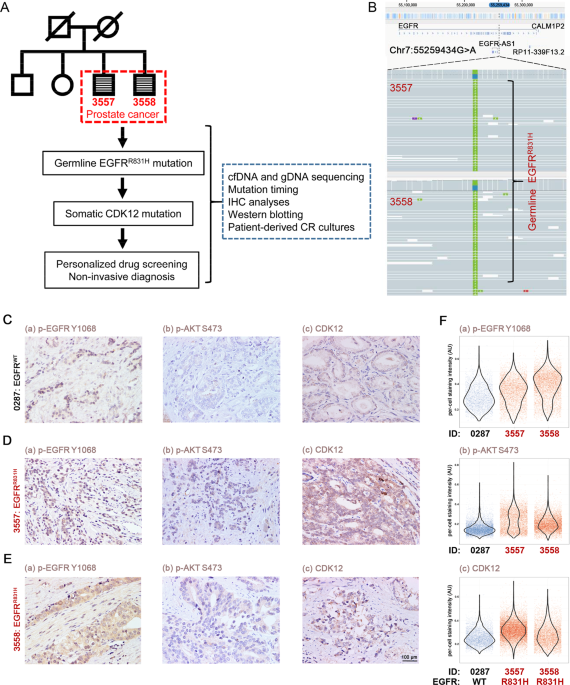
A novel germline EGFR variant p.R831H causes predisposition to familial CDK12-mutant prostate cancer with tandem duplicator phenotype
- Select a language for the TTS:
- UK English Female
- UK English Male
- US English Female
- US English Male
- Australian Female
- Australian Male
- Language selected: (auto detect) - EN
Play all audios:

5–10% of total prostate cancer (PCa) cases are hereditary. Particularly, immune checkpoint inhibitor-sensitive tandem duplicator phenotype (TDP) accounts for 6.9% of PCa cases, whereas
genetic susceptibility genes remain completely unknown. We identified a Chinese family with two PCa patients, in which the PCa phenotype co-segregated with a rare germline variant EGFRR831H.
Patient-derived conditionally reprogrammed cells (CRC) exhibited increased EGFR and AKT phosphorylation, and a sensitivity to EGFR antagonist Afatinib in migration assays, suggesting the
EGFR allele was constitutively active. Both EGFRR831H-mutant tumours contained biallelic CDK12 inactivation, together with prominent tandem duplication across the genome. These somatic
mutations could be detected in urine before surgery. Analysis of public databases showed a significant correlation between the mutation status of EGFR and CDK12. Taken together, our genetic
and functional analyses identified a previously undescribed link between EGFR and PCa.
We thank the patients and their family members for participating in our study. We gratefully acknowledge excellent technical assistance provided by Ms. Yuan Zhu, Ms. Shanshan Zhang, and Ms.
Yayun Fang from Zhongnan Hospital of Wuhan University. We would like to acknowledge the TCGA and COSMIC databases for providing use of data free of charge. We also thank International
Science Editing (http://www.internationalscienceediting.com) for editing this manuscript.
This study was supported in part by grants from the Health commission of Hubei Province scientific research project (WJ2019H080), Chinese Central Special Fund for Local Science and
Technology Development of Hubei Province (2018ZYYD023), Science and Technology Department of Hubei Province Key Project (2018ACA159), and Wuhan Science and Technology Bureau Key Project
(2018061005132294). The funders had no role in study design, data collection and analysis, decision to publish, or preparation of the manuscript.
These authors contributed equally: Kaiyu Qian, Gang Wang, Lingao Ju
Department of Urology, Zhongnan Hospital of Wuhan University, Wuhan, China
Kaiyu Qian, Yongwen Luo, Yejinpeng Wang, Tianchen Peng, Yu Xiao & Xinghuan Wang
Department of Biological Repositories, Zhongnan Hospital of Wuhan University, Wuhan, China
Human Genetic Resources Preservation Center of Hubei Province, Wuhan, China
Laboratory of Precision Medicine, Zhongnan Hospital of Wuhan University, Wuhan, China
Department of Biotherapy, Cancer Center, West China Hospital of Sichuan University, Chengdu, China
All PCa patients, family members of the PCa pedigree, and additional cancer patients, provided written informed consent. All study procedures were performed in accordance with the ethical
standards of the Institutional Ethics Review Committee.
Publisher’s note Springer Nature remains neutral with regard to jurisdictional claims in published maps and institutional affiliations.
Anyone you share the following link with will be able to read this content:
